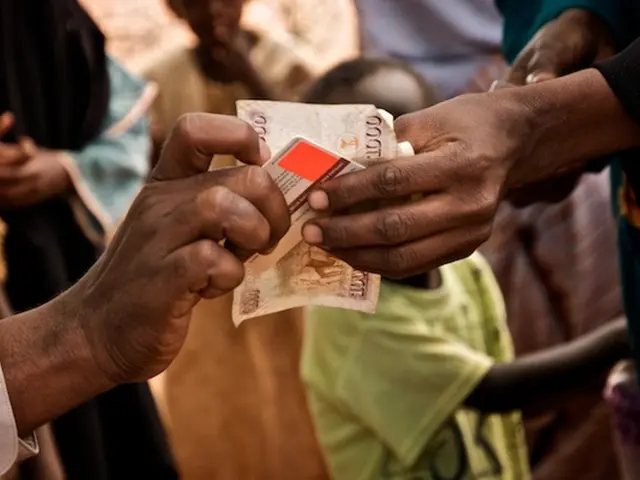Promoting Accountable Wagering: A Route to Safer Betting Practices in the Year 2025
In today's digital age, gambling has become more accessible than ever, with online platforms offering unmatched convenience. However, this increased availability also amplifies the risks associated with gambling. To ensure a balanced and safe experience, the focus is shifting towards responsible gambling practices.
Across various cultures and communities, diverse approaches to gambling are emerging. Some advocate for strict regulations and provide support resources for those battling gambling addiction. Key practices and initiatives promoting responsible gambling include:
- Use of Responsible Gambling Tools: Many online gambling platforms provide tools such as deposit limits, loss limits, session reminders, and self-exclusion options. These allow players to set personal boundaries to prevent excessive gambling behaviors.
- Self-Exclusion Programs: Voluntary self-exclusion permits individuals to ban themselves from gambling venues or sites for defined periods. This exists in various forms, such as individual site self-exclusion, land-based casino exclusions, and broader national or regional exclusion lists, like GAMSTOP and MOSES, which block access to multiple operators simultaneously.
- Behavioral Monitoring and Player Support: Reputable operators employ algorithms to detect unusual gambling patterns and proactively offer breaks or assistance. They also provide in-platform support systems linking players to counseling or addiction resources.
- Regulatory Frameworks: Different countries have distinct regulatory approaches reflecting cultural contexts. For instance, China enforces strict anti-gambling laws on the mainland but allows casino gambling within Macau under heavy surveillance. South Korea bans most gambling except limited state-sanctioned activities, reflecting strong social opposition to gambling. Regulatory bodies ensure operators comply with rules designed to protect consumers and promote responsible play.
- Anti-Money Laundering (AML) and Know Your Customer (KYC) Measures: These are integral to responsible gambling practices, ensuring financial transparency and preventing the use of gambling platforms for illicit activities.
- Public and Industry Initiatives: Government lotteries and public gaming organizations promote responsible gambling through certification programs, education, and public recognition of responsible gaming efforts. Examples include California and Oregon lotteries’ commitment to player protection and responsible gambling education.
As we move towards 2025, the emphasis is on community, support, and the joy gambling can bring. Creating spaces that focus on education and support can change the narrative surrounding gambling, transforming it into a responsible, enjoyable activity for all.
Establishing boundaries in gambling is crucial. This includes knowing when to walk away and recognizing when it becomes a burdensome obligation. Growing up with family gatherings and game nights instilled a sense of community and friendly competition in the speaker, viewing gambling as a social activity rather than just a solitary chase for profit.
An increasing number of gambling sites are implementing self-exclusion tools and educational resources on responsible gaming practices. Numerous apps have emerged to help players track their spending and set reminders for breaks, making the gaming experience more mindful and intentional.
Setting personal limits as a player is empowering. This includes committing to a weekly budget, adhering to time limits, and taking regular breaks. Regular workshops, open discussions, and accessible resources should become ingrained in communities to allow individuals to share experiences and learn from each other.
The proactive shift by gambling sites signifies a notable cultural transition toward prioritizing player well-being. Joining or organizing a local group dedicated to discussing and exploring the principles of responsible gambling can reshape the conversation about gambling.
Normalizing local game nights or gambling awareness events could foster an environment that encourages open dialogue about responsible gambling and prioritizes enjoyment over financial strain. It's time for us to emphasize community, support, and the joy gambling can bring in 2025.
For further information on responsible gambling in 2025, please visit our external resource.
- In the digital era, entertainment platforms such as those offering online casino-and-gambling have flourished, providing ease of access, but it's essential to remember the risks associated with gambling, leading to a focus on responsible practices.
- Diversified approaches to gambling, including control measures, are developing globally, with self-exclusion programs and the use of responsible gambling tools becoming commonplace on online sites.
- Media outlets covering fashion, beauty, and events can play a pivotal role in promoting responsible gambling by featuring stories about the importance of setting personal limits and the dangers of problem gambling, simultaneously raising awareness of responsible gambling initiatives.
- To maintain a positive gaming experience in the future, it's crucial for the media, the industry, and the community to work together by supporting local game nights and gambling awareness events that emphasize education, responsible play, and the joy of friendly competition rather than excessive betting or financial strain.







